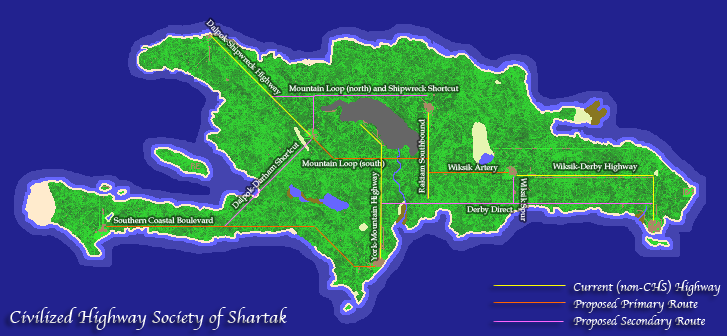Civilized Highway Society
| Civilized Highway Society|-style="background-color: #ffffff; text-align: center;" | 
| ||
| Leadership: | Alexander Black of Durham | ||
| Members: | unknown | ||
| Goals: | Build and maintain high-quality highways linking important Shartak sites | ||
| Recruitment policy: | Agree to our principles, start building highways in line with the standards here, and you're a member! | ||
| Contact: | Talk page | ||
Contents
The Need for Good Roads
Too many poor souls enter this realm completely lost and bewildered. Whether they are newly-arrived Outsiders or youngling Natives, their common problem is an inability to get where they want to go. A few enterprising people have seen fit to begin constructing roads between major villages; often these are used as routes to direct others to sites of pillage and death.
If the isle of Shartak is ever to see the dawn of civilization, we must build and maintain high-quality roads linking all the major cultural and scenic sites. These roads must conform to a well-publicized standard so that new arrivals can easily use them. Missionaries, native shamans, hunters, explorers, and many others will benefit from clearly-demarcated paths through the wild.
Our Mission
This will be an arduous task. In the CHS's observations, one individual can clear a maximum of 3 squares per day while still killing animals to advance (while of course those who either don't desire material reward or have already maxed out their skills can devote all of a day's labor to clearing roads, averaging something more like 7-8 squares per day). Our mission, then, is three-fold:
- identify sites in need of quality transportation
- build, maintain, and if possible patrol roads linking the identified sites
- recruit new members to our cause
The above list should serve as a prioritized list of activities; it does no good to build roads willy-nilly if no one will use them, and if we are not building roads, what use are new recruits?
We must strive to maintain the highest quality of building standards; please see the section below marked Road Standards for the current regulations.
Note well: we are committed to equal-opportunity access to both highway construction and use. Natives, Outsiders, and pirates are all equally welcome to join the clan, build roads, and travel freely (without threat of harm). In times of warfare, CHS members are encouraged not to take sides and to punish any acts of violence perpetrated along CHS-affiliated highways.
Highway Network
Highways are listed in the following format:
Name or Identifier (primary direction of travel) - general location of road
Completed CHS Routes
- Southern Coastal Boulevard (E-W, NW-SE) - leads due east out of Durham along the southwestern peninsula's coast, turning southeast at the base of the peninsula and then east again upon reaching York's line of latitude and continuing into York proper.
Non-CHS Highways Already Under Construction
The following highways are currently under construction, although not necessarily by CHS affiliates. Therefore, our standards on neutrality may not apply. They are listed here because incorporating them into our design significantly decreases the amount of work we have to do.
- Dalpok-Shipwreck Highway (NW-SE) - northwestern island
- York-Mountain Highway (N-S, NW-SE) - central island, west of the river
- Raktam Southbound Highway (N-S) - headed south from Raktam, east of the river (peters out north of the coast)
- Wiksik-Derby Highway (E-W, N-S) - heads east out of Wiksik; turns south near a sandy area and runs to Derby
- York-Derby Jungle Trail (?) - scratched out of the land by a semi-unaffiliated individual; this one intentionally doesn't conform to CHS standards as it is an experiment in lower-maintenance-cost roads
Proposed Primary Routes
These are roads which would immediately provide transportation benefits and should be built first.
- Mountain Loop Highway (roughly circular) - surrounds the central mountain, with Dalpok and Raktam located on its circumference.
- Recommend building the southern half first, with the northern half to be considered a secondary or alternate route
- Wiksik Artery (E-W) - exits Wiksik to the west and ends at the Mountain Loop Highway/Raktam Southbound Highway.
Proposed Secondary Routes
These are roads which would provide secondary, scenic, or otherwise non-essential transportation capabilities. The above primary routes have priority over these.
- Shipwreck Shortcut (E-W) - extends west from the northern rim of the Mountain Loop Highway and terminates at the Dalpok-Shipwreck Highway
- Dalpok-Durham Connector (NE-SW) - runs southwest out of Dalpok and terminates at Southern Coastal Boulevard
- Derby Direct (E-W) - shortcut route between York and Derby, runs east from York-Mountain Highway to Wiksik-Derby Highway
- Wiksik Spur (N-S) - connects Derby Direct to Wiksik (this way, the Society has a connection from Wiksik to Derby in the event that the [non-CHS] Wiksik-Derby Highway ceases to be viable)
- Jack Spalding Highway (?-?) - exploration and mapping of the tunnel under the mountain; one mouth of the tunnel lies at [-70.368,+26.442] (not on the map above)
Road Standards
Road Section
A CHS highway is made up of individual road sections. A road section is an area of jungle cut back to the bare topsoil and connected to other road sections. To minimize the effect of plant regrowth, highways should be two paces wide (thanks Sling). Some of the secondary and spur roads might not warrant such painstaking construction, but it is never inappropriate.
Directness of Highways
A CHS highway should consist of a direct route between two points of interest, subject to variances where it would save a great deal of building and maintenance labor. Although mathematics tells us that the shortest distance between two points is a straight line, it is unfeasible to expect to build straight-line roads around the landform features of the island and with such primitive equipment.
Therefore, roads should consist largely of north-south, east-west, and diagonal sections. Frequent turns or spurs should be avoided.
Signage
It is often useful for travellers to have some sense of the distance to the next point of interest. The most reliable way to sign a road is to build a signpost. These should be built directly in the road; it requires two pieces of driftwood per sign.
Signs should be placed in the following locations:
- At village boundaries, giving the distance to the closest 1-3 landmarks
- At forks or spurs in the road, indicating the direction and distance to the single closest landmark
- Every 50 paces at places where the last two digits of the GPS coordinate in the direction of travel is divisible by 50 (-70.200, -70.250, -70.300, etc.)
Signs should specify distances in units of paces; these can be measured as a change in the thousanths digit of the GPS coordinate. Alternately, someone can simply travel the road, counting paces. These do not have to be exact; it can be difficult to determine where a particular feature or place begins.
If you cannot sign for the above, at least put a marker indicating the highway name.
Example Signage
You see a signpost that reads Sample Highway; Fakevillage 200E; Fakesettlement 360SW
This sign lets you know you're walking on Sample Highway. It also indicates that Fakevillage lies 200 paces east and Fakesettlement lies 360 paces southwest. The direction should always indicate where to go from here; it may be the case that the road changes direction one or more times before reaching the endpoint.
Membership
Please feel free to add yourself to this list!
| This user or clan supports the Identify Friend or Foe initiative. |
